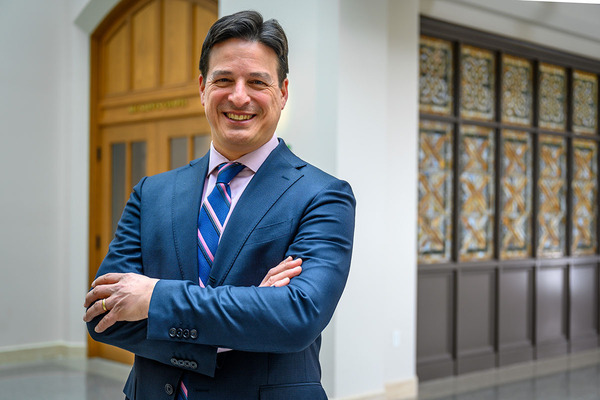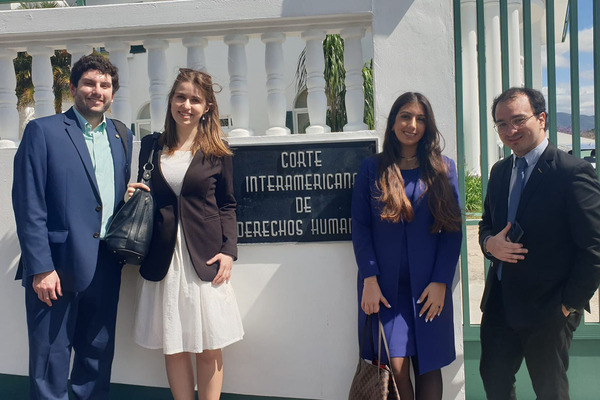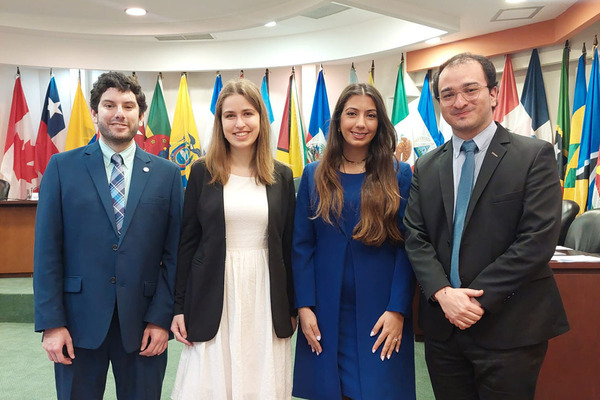

Notre Dame Law Professor Paolo Carozza testified last week in a landmark human rights case before the Inter-American Court of Human Rights in Costa Rica. The plaintiffs in the high-profile case, Beatriz et al. v. El Salvador, are asking the Court to declare the right to an abortion to be an internationally recognized human right.
Beatriz was a 21-year-old woman from El Salvador who sought an early abortion because she suffered from lupus and some of her doctors advised her that pregnancy could exacerbate her health condition, and because her unborn child was anencephalic. She was prevented from terminating the pregnancy because abortion is illegal in El Salvador. The Inter-American Commission on Human Rights filed an application last year before the Inter-American Court of Human Rights arguing that the absolute ban on the elective termination of pregnancy in El Salvador violated that country’s obligations under the American Convention on Human Rights.
Carozza served on the Inter-American Commission on Human Rights from 2006-2010, and was the commission’s president in 2008-09. He is recognized as a leading expert in comparative constitutional, human rights, and international law. He was asked by the Court to testify as an expert witness about which international legal standards should be applied in the case. His 50-page written report and oral testimony addressed how the principle of human dignity is relevant in this case; the importance of the right to equal protection of all humans without regard to their development, capacities, sex, or other condition; and the obligations and discretion of states under international human rights law to adopt measures to protect human life prior to birth.
In his testimony, Carozza said that international human rights law confirms without exception that the recognition and protection of the equal dignity of every human being is the cornerstone of all universal human rights and that the principle of human dignity on which all international human rights law rests consists of four essential qualities: universal, equal, inherent, and inalienable.
“These four dimensions of human dignity have clear implications for the rights at stake in this case. They entail that a mother and her child, born or unborn, including both Beatriz and her daughter, are equal bearers of human dignity,” said Carozza. “That cannot change because one of them is ill or disabled or less developed or more vulnerable, any more than it could change because one human being is of a different gender or race or sexual orientation or social class than another. That equal human dignity in turn requires States to respect and protect the equal human rights of every human being.”
He further said, “The right to life, as noted frequently in this Court’s jurisprudence, is the first of those rights because without it all other rights are rendered null and meaningless. The text of Article 4.1 of the American Convention on Human Rights places it beyond any reasonable dispute that in Inter-American human rights law, human beings are holders of the right to life even before birth, from the moment of conception.”
In conclusion, Carozza urged the Court “to affirm unequivocally that the duty of States is to protect equally the human rights of both women and children, born and unborn.”

Four students from Notre Dame Law School assisted Carozza in preparing for the case and traveled with him to Costa Rica to see firsthand the proceedings of a consequential international human rights case. The group included three students in the LL.M. Program in International Human Rights Law, and one J.S.D. doctoral candidate, Perla Khattar, who was very eager to work on the case. Khattar said she wholeheartedly considers this experience to be the apex and highlight of her career so far.
“As an early-career attorney, I never fathomed while taking my oath that I would have the privilege to work on a case of such magnitude. The intricacy of the subject matter, coupled with the high stakes involved, made the task particularly challenging and at times stressful, but at the same time well worth it,” said Khattar. “In my view, the principles of objective treaty interpretation and State sovereignty are critical pillars upon which the international human right system stands. Furthermore, realizing that the team’s efforts served as ‘the voice of the voiceless’ made this experience profoundly transformative.”
The students conducted extensive legal research on the challenging interrelated issues of the right to life of both mothers and unborn children, which are protected under the right to life in Article 4.1 of the American Convention on Human Rights. The text of this treaty uniquely recognizes the right to life “from the moment of conception.”
Ewa Rejman, an LL.M. student and human rights lawyer from Poland, also worked on the case.
“I’m very grateful for the opportunity to work on this case knowing the impact it may have in Latin America and beyond. To be able to contribute to Professor Carozza’s work, and then listen to him speak in the courtroom about the importance of equal human dignity of all of us and the right to life which is the precondition for exercising any other human rights was really an incredible experience,” said Rejman. “People talk about equality all the time and I’m deeply convinced this is something we should be very concerned about, but real equality must particularly take into account those who cannot even speak for themselves, including those who are not yet born, but already exist in their mother’s wombs.”
The LL.M. Program in International Human Rights Law, directed by Professor of Law and Global Affairs Diane Desierto, provided support for the students to travel and attend the hearings with Carozza in San José, Costa Rica.
“Professor Carozza’s work providing requested expertise to the Inter-American Court of Human Rights in the crucial Beatriz v. El Salvador case was the best recent example of direct experiential learning for our Notre Dame Law School human rights LL.M. and J.S.D. students, in possibly the most high-stakes case in recent years,” said Desierto.
“Working together with our students, Professor Carozza admirably defended that recognizing human dignity for both mothers and unborn children means holding States fully responsible for protecting all human life, without discriminating against humans at any stage or condition of life,” Desierto said. “Our students thus experienced the lived reality of accompaniment, cooperation, solidarity, excellence, and integrity required to defend the human right to life with love, concern, empathy, and State responsibility to support all the humans involved in this very difficult case.”

Josemaría Rodríguez Conca, an LL.M. student from Chile, had previously participated in litigation before the Inter-American Court of Human Right in his positions within the Chilean government. He said that he found working on the case with Carozza a formative experience.
“Working with someone as Professor Carozza with extensive international experience in human rights was an incredible opportunity. The case itself was not an easy one, as abortion is a really important and contentious issue that involves radical postures and is usually part of a broader difficult situation involving suffering, emotional damage, and a context of vulnerability,” said Rodríguez.
“I learned much from the argumentative aspect of the expert report and the oral presentation Professor Carozza gave in front of the Court. Perhaps the latter was the most relevant, as he gave his expert declaration always circumscribed to a legal analysis and maintaining an objective view, while at the same time expressing clearly his position in a non-confrontational way, respecting the alleged victims and addressing the consequences that the Court judgment will have for the right to life and the understanding of what it means to be a human being,” Rodríguez said. “Overall, working on the case with Professor Carozza was really positive and enriching.”
Rodríquez also said that having the opportunity to witness a live hearing, as opposed to via Zoom, was enlightening as it allowed him to notice so many different details about the proceedings, the gestures of the opposing parties, and the way the judges listen to the testimonies.
Another LL.M. student who assisted in the case said, “I thank Professor Carozza for the opportunity to work with him in the Beatriz case, as it was a unique professional and personal experience that I will always treasure in my heart. Professor Carozza is one of the most renowned legal scholars in the field of international human rights law and a role model for many of us. I think his outstanding performance in the hearing and the respect that his peers show for him — regardless of the many differences in perspectives and views — give testimony of who he is and what he means for the human rights legal community.”
The student concluded, “From a professional point of view, this experience allowed me to delve into treaty analysis and the jurisprudence of the Inter-American Court of Human Rights regarding expansive interpretation and affirmative obligations of States with respect to the right to life. I think the outcome of this case will definitely be a turning point for the Inter-American System of Human Rights and for international human rights law generally.”
The case will likely be decided in six months. If the Court rules in favor of the plaintiffs, it would be the first time that any court has ever recognized abortion as an international human right. The impact would be felt not only in El Salvador, but in all of the 35 countries that are part of the Inter-American human rights system.
“Given the importance and prestige of this Court, it would have an enormous impact on international human rights law more generally,” said Carozza.
A video of Carozza’s testimony is embedded below. Watch a video of the full hearing here.
Professor of Law Paolo Carozza currently serves on the European Commission for Democracy through Law (the Venice Commission) and is a member of the Oversight Board, an independent expert body created by Meta. He was previously a member of the U.S. State Department’s independent, nonpartisan advisory Commission on Unalienable Rights. Carozza founded and directs the Notre Dame Constitutionalism and the Rule of Law Lab. For over a decade he served as director of Kellogg Institute for International Studies and of Notre Dame Law School’s J.S.D. program. His scholarly books and articles in the areas of comparative constitutional law and human rights law have been published widely in four languages.
Originally published by at law.nd.edu on March 30, 2023.